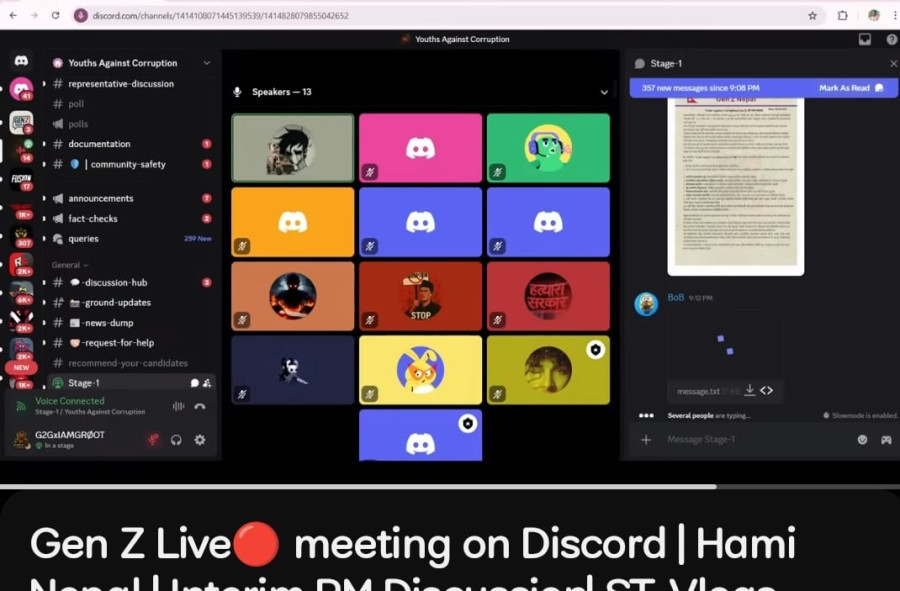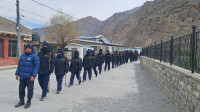Politics
How Nepal’s enraged Gen Z turned Discord into a political arena
Youths say narrative that Nepal ‘elected prime minister via Discord’ discredits uprising.
Aarati Ray
Group chat that’s all fun and games. That’s how the social media platform Discord, popular among gamers, bills itself, pledging a space to “talk, play, and hang out”.
But in early September, amid Nepal’s Gen Z uprising, Discord took on an entirely new life. It was anything but fun and games. And the majority of Nepalis using it were not avid gamers but those anxious about their country’s future.
For Nepali Gen Z-ers, who spearheaded the protests, the platform unexpectedly turned into a hub for political debate and decision-making amid the power vacuum following the protests.
Ever since, Discord, once limited to young gamers and anime fans, has become a curiosity for many Nepalis. For instance, parents asking their kids about Discord and older generations turning to Gen Z-ers in confusion became a running joke.
Memes like ‘I was explaining Discord to my parents’ or ‘My dad asked if Gen Z is voting via Discord, what is this?’ flooded timelines.
Now, with Dashain around the corner, posts and memes are swirling about how Gen Z-ers, usually avoiding politics in festival gatherings, will this time be in the forefront, explaining the Gen Z uprising and Discord to curious relatives.
“At first, when I heard discussions [about Nepal’s future] were happening on Discord, I was completely surprised,” said Medhavi Shrestha, a long-time Discord user and journalism student. “It sounded very absurd to me.”
Perhaps it was precisely this element of surprise, transforming a platform known for gaming into a political forum, that drew global headlines.
For instance, The New York Times reported, ‘The Parliament of Nepal right now is Discord.’ Al Jazeera framed it as: ‘More egalitarian’: How Nepal’s Gen Z used gaming app Discord to pick PM’.
As media and online content continue to link Discord to Gen Z activism and the interim government, Gen Z-ers urge a more nuanced view.
Gen Z-ers say the narrative that Nepal “chose a prime minister via Discord poll” misrepresents the uprising, which was largely multi-platform and socially rooted.
Tanuja Pandey, an active participant in the Gen Z movement, says, while Discord helped gauge popular sentiment and popular choice discussions on social media, claiming “the PM was chosen only through Discord is an overstatement”.
She also cautioned the media against amplifying such narratives. Pandey added people weren’t engaged only on Discord; they were equally active on Facebook, Instagram, Reddit and other platforms. “I strongly disagree with the narrative that the prime minister was chosen solely through Discord,” she added.
So, what exactly is Discord?
Discord is a US-based social media platform offering free voice, video, and text communication. Launched in 2015 by Jason Citron and Stanislav Vishnevskiy, Discord was originally designed for gamers.
Over time, however, it expanded far beyond gaming. Its features, including in-game overlays, direct messaging, streaming, and customisable emojis, have helped the platform attract more than 200 million users worldwide.
How Discord became Gen Z’s forum for political action
In the aftermath of the September 8 protests, the collapse of KP Sharma Oli’s government plunged the country into a power vacuum. The army intervened, opening negotiations that brought Gen Z representatives to the table for the formation of an interim government.
By September 10, online discussions focused on selecting a Gen Z representative to engage with the Army Chief, the potential dissolution of Parliament, the formation of an interim government, and the timing of early elections.
Much of this conversation took place on the Discord channel Youth Against Corruption, which boasts over 160,000 members, moderated by the NGO Hami Nepal, which was at the forefront of the protests.
The server quickly became a central hub for debates and leadership votes for the interim government, with the sessions simultaneously livestreamed on YouTube.
Throughout the day, as a group of Discord moderators debated leadership and strategy online, other Gen Z representatives from Hami Nepal, All Nepal Gen Z Officials, anti-corruption protest groups, and Gen Z Nepal participated in in-person negotiations at the Nepal Army headquarters.
The live Discord session drew a mix of cautious praise and sharp criticism.
Many remarked they live in interesting times and that they never imagined a day when the country’s direction would be shaped through a Discord server.
Twitter user Nico Robin said, “The kids have their hearts in the right place—they just need a bit of political education. But it’s crazy that I can participate in Nepal’s political process through Discord.”
Yet the majority of reactions were far less approving. Some expressed concern over the participants’ competence: “I listened to the Discord discussion, and I’m super worried,” one critic tweeted.
Another commenter remarked, “Gen Z la-la land. What a dysfunctional society we’ve created.”
Many online viewers of the livestream also observed the chaos, noting that Gen Z-ers seemed unsure of the way forward, were often overwhelmed and frequently bickering among themselves.
For the interim leadership, names in circulation included former Nepal Electricity Authority chief Kulman Ghising, Dharan Mayor Harka Sampang, youth leader Sagar Dhakal, and social entrepreneur Mahabir Pun.
In the end, a consensus formed around former Chief Justice Sushila Karki.
An open Discord poll drew 7,713 votes, with Karki receiving the highest 3,833 (50 percent) votes.
On September 12, after political negotiations, Karki was officially appointed Nepal’s 42nd prime minister.
The decision made international headlines, with many outlets spotlighting the unprecedented role of a youth-driven Discord forum in shaping the country’s political future.
Post-polls, what Discord means to Gen Z
Gen Z-ers do have some apprehension about Discord polls.
Recalling his time on the Hami Nepal Discord server, Aditya Khare, a Gen Z participant, said that while the polls made people feel heard, the conversations themselves were far less inclusive. “Moderators decided who got to speak, so not everyone had a chance,” he explained.
Khare, like many, has doubts about the reliability of the polls conducted on Discord, pointing out that their anonymous nature might have allowed individuals to vote multiple times. Without official data from the platform, there is no way to verify genuine participation.
Gen Z also feels that the attention on Discord has been exaggerated, likely because it makes for a catchy headline, even though many other factors shaped the outcome.
Shrestha says portraying the movement as simply “Gen Z choosing their prime minister on Discord” stereotypes Gen Z as unserious. “The Discord angle makes it seem like we were there just for a trend,” she added.
Gen Z-ers say that Karki’s appointment was a pragmatic choice amid a power vacuum rather than being based solely on a Discord poll. Gen Z-ers alone were not driving a full-scale political upheaval, and that Karki’s selection had support beyond youth circles, including intellectuals and broader Nepali society.
Khare emphasised that Discord discussions were not decisive in the movement’s outcomes. “I think Discord was more a way to keep Gen Z-ers engaged in the conversation, while the real decisions were being made elsewhere, indirectly,” he said.
While Karki’s popularity on Discord and other platforms was apparent, it was ultimately her credibility, track record, and widespread public backing that secured acceptance from the President and others.
Pandey cautioned against treating Discord as a symbol of electoral legitimacy. “It shouldn’t be celebrated as if we elected a prime minister through Discord,” she said, warning that such a narrative could be dangerous in the future, given uncertainties around the credibility of the voting.
While acknowledging the platform’s role, she stressed that the episode should be seen as a learning moment, not a ‘glorified spectacle’.
In recent weeks, Discord’s popularity has surged, attracting not just Gen Z-ers but older users curious about its role in interim leadership discussions.
Digital safety expert Anil Raghuvansi noted that such sudden shifts in online behaviour carry risks. He explained that when a platform, whether Discord, Gemini AI trends, or any social media app, gains sudden popularity, people of all ages often join out of curiosity without fully understanding its features or safety protocols.
This exposes users to risks such as hate speech, bullying, privacy breaches, data leaks, grooming, and other forms of abuse. Raghuvansi stressed the importance of caution, advising users to review a platform’s safety measures and protections before joining. He noted that most platforms, including Discord, offer official resources on their website to help users understand potential risks and safety features.




 9.56°C Kathmandu
9.56°C Kathmandu















